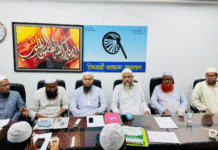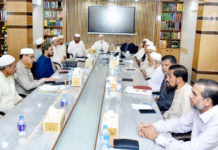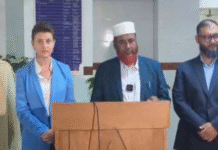
Highlights
- BNP, Jamaat are courting smaller groups but have no formal alliances yet
- BNP, NCP relations have strained, while Jamaat, NCP have grown closer
- BNP plans to form a national govt with anti-Hasina allies if it wins
- Jamaat seeks to unite Islamist, centrist parties to consolidate Islamist vote
The nearly 24-year-old alliance between BNP and Jamaat has ended, and the two parties are now rivals, each seeking new allies amid a changing political landscape.
Ahead of the 13th national election, both parties are working to form separate alliances and make new deals to strengthen their positions. While no formal alliance or electoral deal has been forged, both parties are actively engaging with smaller groups to expand their camp, at least in numbers.
BNP has been in talks with its partners in simultaneous movements as well as with Islamist parties. Its liaison committee has held regular meetings with Ganatantra Mancha, the 12-party alliance, and Jatiyatabadi Samamona Jote.
However, relations between BNP and the National Citizen Party (NCP) have strained recently, while Jamaat and NCP have come closer.
BNP Standing Committee member Amir Khasru Mahmud Chowdhury told TBS, “We are committed to alliance — leaving alliance is not an option. We started a simultaneous movement with 42 parties, and later more joined, making around 50 to 52 parties in total.”
“We want honesty in politics. BNP talks about forming a national government every day. We have not changed that goal. All these parties have fought hard to remove Hasina from power. Many have been jailed, and many leaders and activists have died. Everyone’s efforts should be respected. The national government will include everyone,” he added.
BNP maintains that a final decision on formal alliances will be made once the election schedule is announced. It remains committed to forming a national government with the parties that took part in the anti-Hasina movement if it comes to power through a public mandate.
Meanwhile, Jamaat-e-Islami is working to bring together Islamist and centrist parties, with the aim of consolidating the Islamist vote through an electoral alliance. Most Islamist parties, including Islami Andolan Bangladesh, reportedly support the idea.
Jamaat’s Assistant Secretary General Advocate Ahsanul Mahboob Zubair told TBS, “The idea of uniting Islamist votes is still being discussed. Nothing is decided yet. We are holding regular meetings to plan the next steps. Some changes are still needed. But we hope to make a decision before the election schedule.”
Jamaat first came to power through the 2001 national election by joining the Four-Party Alliance formed in 1999 and led by the BNP. This alliance won a large majority in parliament, with Jamaat securing two key cabinet posts—the Ministry of Agriculture and the Ministry of Industries. However, the alliance was heavily defeated by the Awami League-led Grand Alliance in 2008.
On 18 April 2012, the Four-Party Alliance expanded and was renamed the 18-Party Alliance to strengthen opposition demands for restoring the caretaker government system. Later, it became the 20-Party Alliance as more groups joined. This alliance was dissolved on 12 December 2022.
On 19 July, Jamaat held a rally at Suhrawardy Udyan in Dhaka — a major political event — where 11 religious and centrist parties joined, including NCP, Islami Andolan Bangladesh, Khelafat Majlis, Hefazat-e-Islam, Bangladesh Khelafat Majlish, Gono Odhikar Parishad, Bangladesh Nezame Islam Party, Bangladesh Khilafat Andolan, Bangladesh Development Party, Jatiya Ganatantrik Party (Jagpa), and Bangladesh National Hindu Grand Alliance.
Jagpa, known as a BNP ally and part of the simultaneous movement, also participated. Its vice-president and spokesperson, Rashed Prodhan, said, “We were with BNP in the movement against Hasina’s fascist rule, and we still are. We stand with any party that opposes Hasina, fascism, and Indian interference — whether it’s BNP or Jamaat doesn’t matter.”
“We haven’t yet decided whether we’ll contest the election jointly or on our own. There has been no discussion on alliances or seat-sharing. We supported the seven-point demand raised at the Jamaat’s rally, which is why we joined the platform,” he added.
Following Jagpa’s participation in the Jamaat rally, it was reportedly expelled from the 12-party alliance. A statement signed by alliance coordinator Syed Ehsanul Huda said the party had long been uncooperative and violated alliance discipline.
A recent South Asian Network on Economic Modelling (Sanem) survey of youths aged 15–35 found that 38.76% expect the BNP to get the most votes in the upcoming election, followed by Jamaat (21.45%) and NCP (15.84%).
The Awami League, if allowed to contest, is projected to receive around 15%, while smaller parties like the Jatiya Party and other Islamist groups may get 3.77% and 4.59%, respectively. The survey covered 2,000 respondents across all eight divisions.










why the author or survey even included the question of “If AL is allowed to run…”. Hasn’t the party already been banned? It must be banned forever, so it can never again deceive the people, become a dictatorship, allow SH to retun to power and/or any such shenanigans.